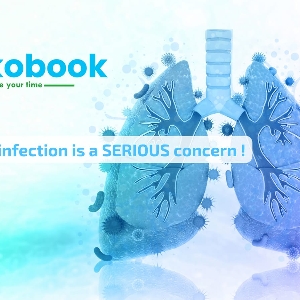Lung Infection Is A Serious Concern!
A Lung Infection, also known as lower respiratory tract infection, refers to an infection that affects the structures and tissues of the respiratory system, particularly the lungs. The respiratory system includes the airways (trachea and bronchi) and the air sacs (alveoli) in the lungs, where the exchange of oxygen and carbon dioxide takes place. Common symptoms of lung infections may include: - Cough: Often productive with phlegm or mucus. - Shortness of breath: Difficulty breathing or rapid breathing. - Chest pain: Pain or discomfort in the chest, often worsened by coughing or deep breaths. - Fever: Elevated body temperature is common, especially in bacterial or viral infections. - Fatigue: Feeling tired or weak. - Wheezing: A high-pitched whistling sound when breathing, often seen in asthma or viral infections. Lung infections are a serious concern for several reasons: 1. Vital Organ: The lungs are essential for breathing, as they facilitate the exchange of oxygen and carbon dioxide in the body. Any infection or damage to the lungs can impair this critical function, leading to a decrease in oxygen levels and potentially life-threatening respiratory distress. 2. Rapid Spread: Lung infections, especially those caused by viruses or bacteria, can spread quickly within the respiratory system and sometimes to other parts of the body. This rapid spread can lead to severe illness and complications. 3. Respiratory Distress: Lung infections can cause symptoms like coughing, shortness of breath, chest pain, and fever. In severe cases, they can lead to acute respiratory distress syndrome (ARDS), a condition characterized by severe lung inflammation and fluid buildup, which can be fatal. 4. Complications: Lung infections can lead to various complications, such as pneumonia, pleurisy (inflammation of the lining around the lungs), and lung abscesses. These complications can prolong the illness and increase the risk of long-term lung damage. 5. Vulnerable Populations: Certain groups of people are particularly vulnerable to lung infections, including the elderly, young children, individuals with weakened immune systems, and those with underlying health conditions such as asthma, chronic obstructive pulmonary disease (COPD), or heart disease. For these individuals, lung infections can be especially dangerous. 6. Potential for Outbreaks: Respiratory infections, such as influenza and COVID-19, have the potential to cause widespread outbreaks, leading to public health crises. These infections can overwhelm healthcare systems, strain medical resources, and result in a significant number of hospitalizations and deaths. 7. Antibiotic Resistance: Some lung infections are caused by bacteria, and the overuse or misuse of antibiotics can contribute to the development of antibiotic-resistant strains of bacteria. This makes treatment more challenging and can result in prolonged illness or treatment failure. 8. Impact on Quality of Life: Even if lung infections are not life-threatening, they can significantly impact a person's quality of life. Symptoms such as chronic cough, fatigue, and reduced lung function can persist long after the infection has cleared. In summary, lung infections are a serious concern due to their potential to cause severe respiratory distress, complications, and even death, especially in vulnerable individuals. Types of infection that can affect respiratory system:- There are various types of lung infections that can affect the respiratory system. It can be caused by different microorganisms, including bacteria, viruses, fungi, and even parasites. Here are some common types of lung infections: Pneumonia Bronchitis Tuberculosis (TB) Lung Abscess Fungal Lung Infections Parasitic Lung Infections Viral Respiratory Infections Non-infectious Lung Conditions The treatment and management of lung infections depend on the specific causative agent and the severity of the infection. It's essential to seek medical attention if you experience persistent respiratory symptoms or suspect a lung infection, especially if you have underlying health conditions that may increase the risk of complications. Proper diagnosis and treatment are crucial for a successful recovery and to prevent the spread of contagious lung infections to others. The severity of a lung infection can vary widely, from mild cases that resolve with rest and over-the-counter medications to severe cases that require hospitalization and intensive medical intervention. Treatment depends on the cause of the infection and may involve antibiotics for bacterial infections, antiviral medications for viral infections, or antifungal drugs for fungal infections. It's important to seek medical attention if you suspect you have a lung infection, especially if you have difficulty breathing or other concerning symptoms. Early diagnosis and appropriate treatment are essential for a full recovery. For medical consultation you can visit your nearest Pulmonologist by taking online appointment from www.quickobook.com
Read More







 Play Store
Play Store